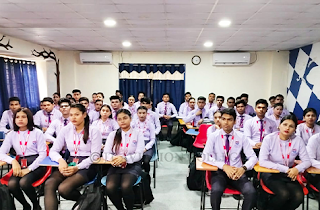Can I Choose a Flexible Schedule for Cabin Crew Training?
Key Takeaways:
- Many training institutions now offer flexible options for cabin crew programs, including part-time, online, and hybrid formats.
- Self-paced training allows aspiring flight attendants to learn at their own speed, providing greater flexibility in managing their schedules.
- Online and hybrid options make flight attendant training accessible to individuals across various locations, accommodating diverse lifestyles.
- Flexibility in training includes hands-on practical sessions that help students gain essential experience while balancing other commitments.
- Choosing the right training program depends on personal circumstances and professional aspirations.
Embarking on a career as a cabin crew member is an exciting opportunity that promises travel, new experiences, and the chance to serve others. However, before stepping into this rewarding role, aspiring flight attendants must complete cabin crew training.
For many, juggling training with work, family, and other responsibilities can be challenging. A common question among future cabin crew members is: Can I choose a flexible schedule for cabin crew training?
In this article, we'll explore the various flexible training options available for those interested in becoming cabin crew members and how to find programs that fit your lifestyle.
Understanding Cabin Crew Training
Cabin crew training is crucial for preparing individuals to take on the responsibilities of flight attendants. This intensive training covers a wide range of topics, including safety procedures, customer service, emergency response, in-flight operations, and aviation regulations. Trainees also learn essential first-aid skills and how to manage diverse passenger situations.
Typically, training consists of both theoretical classroom instruction and practical, hands-on experiences, such as simulations of in-flight scenarios and emergency evacuations. The duration of cabin crew training varies by airline or institution but generally lasts between 4 to 12 weeks.
Is a Flexible Schedule for Cabin Crew Training Possible?
Yes, a flexible schedule is indeed an option! While many airlines offer structured full-time training programs, numerous educational institutions and flight schools now provide more adaptable training alternatives. This flexibility is especially beneficial for individuals who may be unable to commit to full-time training due to personal or professional obligations.
Let’s explore the various options available for aspiring cabin crew members seeking a more flexible schedule.
1. Full-Time Cabin Crew Training Programs
Full-time training programs, often sponsored by airlines, offer intensive training that typically requires students to attend classes five days a week. These programs feature a structured schedule that includes classroom instruction, simulations, and practical assessments.
Ideal for: Individuals who can fully commit to their training and wish to complete the program quickly.
2. Part-Time Cabin Crew Training Programs
For those needing more flexibility, part-time cabin crew training programs are an excellent option. These programs typically offer classes during evenings or weekends, allowing trainees to balance their studies with work or other responsibilities. While part-time programs may take longer to complete, they provide essential flexibility for those managing multiple commitments.
Ideal for: Individuals who have busy schedules or other obligations and want to pursue cabin crew training without sacrificing their existing responsibilities.
3. Online Cabin Crew Training Programs
Online cabin crew training programs provide another flexible alternative. These courses allow students to complete theoretical components of their training at their own pace from the comfort of their homes. Topics covered may include safety protocols, customer service procedures, and emergency response. However, students will still need to attend in-person sessions for practical training.
Ideal for: Aspiring flight attendants who require a flexible, self-paced option and cannot commit to regular in-person classes.
4. Hybrid Cabin Crew Training Programs
Hybrid programs combine online learning with in-person practical sessions. This approach allows students to complete the theoretical coursework online at their convenience while attending scheduled practical training sessions for hands-on experience. This blend of flexibility and practical training is perfect for individuals juggling multiple commitments.
Ideal for: Those who appreciate the benefits of online learning but also need hands-on experience to acquire essential skills.
5. Self-Paced Cabin Crew Training Programs
Some institutions offer self-paced learning as part of their cabin crew training programs. This format allows students to progress through course materials and complete assessments according to their schedules, making it particularly appealing for those with demanding commitments.
Ideal for: Individuals with unpredictable or busy schedules who prefer to learn at their own pace.
Considerations When Choosing Flexible Cabin Crew Training Programs
When evaluating flexible training options, it’s important to consider several factors to ensure you choose the best program for your needs:
- Accreditation: Confirm that the program is accredited by relevant aviation authorities or recognized by airlines, enhancing your employability upon completion.
- Duration: Flexible and part-time programs may take longer to finish than full-time training, so think about how quickly you want to enter the workforce.
- In-Person Requirements: Even flexible programs require practical training, so ensure you can attend the necessary sessions to obtain certification.
- Cost: Flexible training programs may come with higher tuition fees compared to traditional airline-sponsored courses. Assess your budget and financial situation before making a decision.
Flexibility in Cabin Crew Training: A Reality
For aspiring flight attendants, a range of flexible training options is now available to accommodate different schedules and lifestyles. While traditional full-time programs remain common, part-time, online, and hybrid formats are making it easier for individuals to balance training with their personal and professional commitments.
Institutions like Eton College in Canada offer comprehensive Flight Attendant Preparation Programs that equip students with the skills and knowledge needed for a successful career in aviation. Whether you prefer part-time classes or online courses, Eton College ensures you are well-prepared to embark on your journey as a flight attendant.
Ultimately, the right training program will depend on your personal circumstances and career aspirations. With these flexible options at your disposal, the dream of becoming a flight attendant is more achievable than ever, regardless of your current commitments.


.jpg)
.jpg)
Comments
Post a Comment